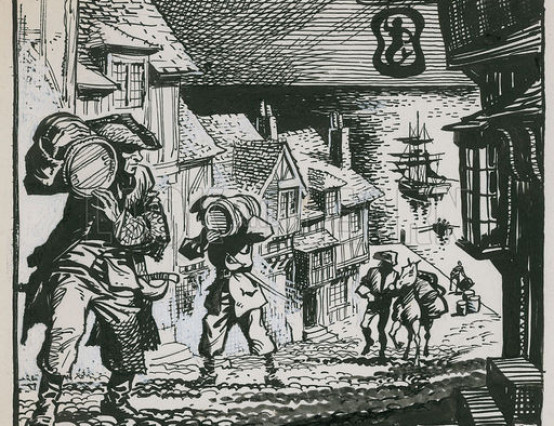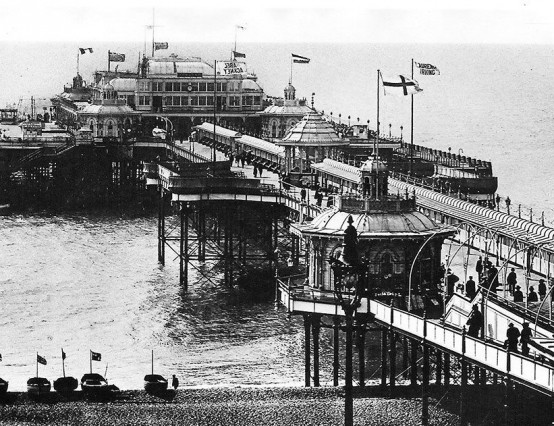“When our third album comes out, our place as the quintessential English band of the '90s will be assured. That is a simple statement of fact. I intend to write it in 1994." Blur’s frontman Damon Albarn in 1990 prophesising what would become Parklife.
You might’ve heard of Parklife. You might know some of the songs, ‘Aaaall the people’ and all that, but perhaps, like I didn’t, you don’t know it that well. Blur’s 1994 album is a proclamation of British defiance, a reaction to the Americanisation of British pop culture. To set the scene, I’m going to give a brief history of Blur’s experience of the leadup to the album’s release.
Following the success of their first real hit (There’s no other way) and the release of Leisure, their first album in 1991, Blur were shipped off to America to help them get out of debt by selling t-shirts on tour. Although they were received relatively well, the scene was rapidly changing right underneath their feet. Nirvana’s Nevermind sparked the fire that was Grunge, which quickly started building traction in the UK. Being aboard on tour, Blur were complete bystanders to this and suddenly yesterday’s news. A review of Leisure stated that it was very much in the present, not pushing any boundaries, so now, it was in the distant past. Returning home to London, they were greeted by a brief period of quiet in British music and were acutely aware of what they wanted to kick against, none more so than lead singer Damon Albarn.
Britpop was not an accident. If you ask anyone to do with Blur, it was Damon Albans idea, but given their current musical climate, it was a hard sell to their record label. Parklife was actually Blur’s second attempt at staging a British popular culture renaissance, their first was with their album Modern Life Is Rubbish, released in May 1993. Their idea didn’t impress the press either as not one review of their show in which they debuted the songs from Modern Life was published.
It was only after Modern Life Is Rubbish’s release was when momentum really started to build. Things started to change for the band. Mods invaded their gigs (brushing aside the teenyboppers that previously filled the front row), they had 3 singles at No.28, got on their first front cover since 1991 and word was spreading of their ambitious new output. They even tried out a few new songs that they’d demoed live in the summer (even after the release of Modern life is Rubbish, they continued writing new material almost immediately). Murmurings, intimations of what was to come gleamed into view.
Reading ’93 was the moment cited by many as the time where it was certain that something different was happening, a movement was starting. It was Britpop’s event horizon – as if all the proponents of those murmurings, beneath the surface of the British cultural scene were suddenly gathered together at the Melody Maker stage.
After that, it was straight back to Maison Rouge in Fulham to record what would become Parklife.
The album, I think, is sometimes viewed as if its title track were a fair representation of the album as a whole. The album is unified in its Britishness in one way or another, but listening to the album all the way through, the diversity within this realm both musically and thematically is fairly vast.
First, onto the topic of songs of a jaunty, biographical nature. These are songs about Blur’s England, described best by Damon Albarn in 1993.
“We became obsessed with this fantasy England we had created while we were in America – a nostalgic, comforting green island where everyone was all right.”
It was a place created by nostalgia and homesickness which lingered long after returning home, thanks to the aforementioned Seattle invasion of Grunge. Many of the songs in this category lie therefore not just in the 90’s or in the recesses of their childhood, but in their England, which takes inspiration from both. This is especially true of the title track and Bank holiday. Girls and Boys, London Loves, Tracy Jacks and Jubilee lie more in the 90’s. Regardless of some of some of the cynical lyrics, these songs were written for young people to enjoy themselves to.
For me, the exemplars of this category are Boys and Girls and London Loves. Girls and Boys kicks the album off. It’s about, and certainly suited to, clubbing on holiday where sex, drink and drugs (but mainly sex) are the only three items on the itinerary. A funky, driving bassline is supplemented by synth and elevated by Dave Rowntree’s drums. The guitar and vocals characterise the now familiar, jaunty chorus present through much of the album.
I’d be uncomfortable calling London Loves jaunty but it’s certainly upbeat and, in my opinion, the quintessential Blur, Britpop track. The main subject of the song is a man inspired by a character in Martin Amis’ London Fields – a book sharing Albarn’s fascination with the ‘seedier side’ of England. Character studies are one of the primary tools used on this album to communicate Blur’s England to the listener. These archetypes are designed to be familiar and evoke imagination and association. The song then zooms out in the chorus and Albarn sings about what ‘London[, as a not quite real collective,] loves’. It’s got classic Damon Albarn drawl all the way through and constantly developing guitar with Graham Coxon moving through a bright, almost percussive verse section into a chorus with a bit more attitude which carries through to a distorted solo. Alex James makes the most of his licence to groove while sturdy drums are the undoubted backbone.
The medium of communication changes slightly on some of the more melancholic tracks. Albarn still wants to capture the stories and feel of the time – ultimately looking to get hold of the zeitgeist– but moves away from biography to his own personal experiences. This is especially true of End of a Century and Badhead, which both celebrate the drudgery and inertia of life and relationships in a loud, grand way. Albarn sings ‘and in any case I’d rather wear it, it’s like bad head in the morning’ and ‘we wear the same clothes cos we feel the same’ in Badhead and End of a Century respectively while both are accompanied by busy chorus’ and orchestral trumpets. The combination of celebration and drudgery evokes nostalgia and even poignance, but why? I think it’s because the songs are about states of life that, given the choice, most people would rather not inhabit and yet these eras have a real atmosphere.
“I can’t write about the depths of misery because I’ve never felt it.” States Albarn in 1993, but it doesn’t halt Blur’s production of brilliant melancholia. Although if you are interested in the depths of misery, look no further than No Distance Left to Run on Blur’s 1999 album ‘13’.
The masterpiece of this album is it’s 15th and penultimate track: This is a Low. The music for the song predated the lyrics, which only came to Albarn after Alex James gave him a handkerchief with a map of the British shipping regions on it for Christmas. It’s not surprising if that struck a note though, as the band used to listen to the forecast in America to remind them of home. It’s lyrics borrow from the late night shipping forecast, but in the chorus, Albarn assumes the role of broadcaster telling his listeners not just of a ‘low pressure area of weather’ (a Low) hitting Britain, but of solitude and sorrow. It’s set apart, though by its devastatingly emotive sound. At first, a subtle and melancholic verse lures and lulls you in before an intense amalgam of melody forms the chorus and runs into a powerful solo. It’s an experience, as is the now 26-year-old album.
A very brief history of Britpop: Parklife
I Look into the inspiration behind one of my favourite albums as well as look to explain the origins of some of the most important songs in Britpop.






0 Comments